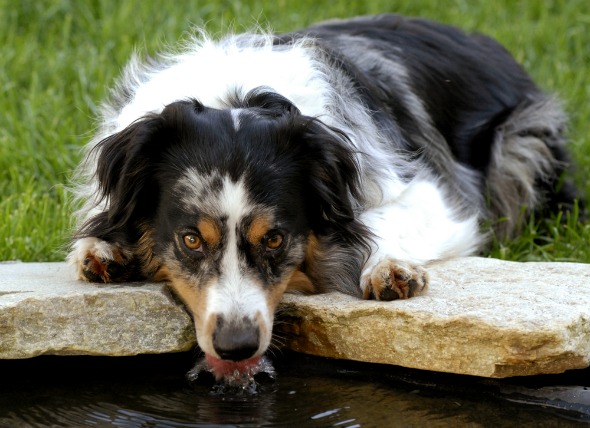
Histiocytic ulcerative colitis is an uncommon disease characterized by ulcers in the lining of the colon, and inflammation with periodic acid-Schiff (PAS) positive histiocytes. Histiocytes are the large white blood cells that reside in the normal connective tissue, where they ingest infectious microorganisms and foreign particles. They are an essential component of the immune system. The origin and pathogenic mechanism for this disorder is unknown; however, an infectious cause is assumed.
It affects primarily young boxers, usually less than two years of age, and has also been reported in French bulldogs, a mastiff, an Alaskan malamute, an English bulldog, and a Doberman pinscher. Histiocytic ulcerative colitis may also have a possible genetic basis, but the cause is unknown.
There is no known cause or predisposing factors, other than being breed-related in Boxer dogs.
Your veterinarian will need to rule out other causes for the colitis. There are so many possible causes for this condition, your veterinarian will most likely use differential diagnosis. This process is guided by deeper inspection of the apparent outward symptoms, ruling out each of the more common causes until the correct disorder is settled upon and can be treated appropriately. Causes that will be confirmed or ruled out in this process include nonhistiocytic IBD, infectious colitis, parasitic colitis, and allergic colitis.
Other diagnoses that may become apparent include cecal inversion, where the first portion of the large bowel is turned in on itself; ileocolic intussusception, where one part of the bowel passes into the next one; neoplasia, such as lymphoma or adenocarcinoma - a type of cancer that originates in a gland; a foreign body; rectocolonic polyps; and irritable bowel syndrome. Differentiation can be made by examination of fecal flotations, direct smears, bacterial culture for pathogens, abdominal imaging, and colonoscopy with biopsy.
A colonoscopy of the intestines may reveal patchy red foci (pinpoint ulcerations), overt ulceration, thick mucosal folds, areas of granulation tissue, or narrowing of the intestine. Multiple biopsy specimens will need to be taken to obtain a diagnosis.
Your dog's outpatient medical management will include changing the diet to include moderately fermentable fiber supplementation. Your veterinarian will advise you of the possibility of progressive disease and recurrence and may prescribe antimicrobials and anti-inflammatory drugs.
Clinical signs and body weight should be monitored every week to two weeks initially. Depending on the outcome, your dog may need ongoing antibiotic therapy.
 Vaginal Inflammation in Dogs
Vaginitis in Dogs
The term vaginitis refers to in
Vaginal Inflammation in Dogs
Vaginitis in Dogs
The term vaginitis refers to in
 Unintentional Eye Movement in Dogs
Nystagmus in Dogs
Nystagmus is a condition
Unintentional Eye Movement in Dogs
Nystagmus in Dogs
Nystagmus is a condition
 E. Coli infection in Dogs
Colibacillosis in Dogs
Colibacillosis is a diseas
E. Coli infection in Dogs
Colibacillosis in Dogs
Colibacillosis is a diseas
 Yellow Skin (Jaundice) in Dogs
Icterus in Dogs
The term icterus (or jaundice) de
Yellow Skin (Jaundice) in Dogs
Icterus in Dogs
The term icterus (or jaundice) de
 Crystals in the Urine of Dogs
Crystalluria in Dogs
Crystalluria is characterize
Crystals in the Urine of Dogs
Crystalluria in Dogs
Crystalluria is characterize
Copyright © 2005-2016 Pet Information All Rights Reserved
Contact us: www162date@outlook.com